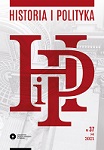Znaczenie przywództwa kooperatywnego w Unii Europejskiej w świetle teorii neoliberalnego instytucjonalizmu
The Importance of Cooperative Leadership in the European Union in the Light of the Theory of Neoliberal Institutionalism
Author(s): Sylwia ZawadzkaSubject(s): Political Theory, International relations/trade, Security and defense, EU-Approach / EU-Accession / EU-Development
Published by: Wydawnictwo Naukowe Uniwersytetu Mikołaja Kopernika
Keywords: international cooperation; neoliberal institutionalism; European diplomacy; Common Foreign and Security Policy; cooperative leadership;
Summary/Abstract: The model of cooperative leadership is an alternative solution to leadership understood in terms of domination, hegemony or imposing its own political will on other entities participating in the system of mutual connections. The specificity of the political system of the European Union gives great importance to both intergovernmental and supranational mechanisms, while the key role in shaping this system is still played by the Member States. Although the treaty provisions ensured formal equality of states, the importance of Germany as an informal leader of the Community is increasingly becoming the subject of political debate about the EU. Taking into account the assumptions of neoliberal institutionalism related to both the key position of states and the great importance of institutions guaranteeing the transparency of their activities, as well as taking into account the long-term benefits of cooperation, the article defines the concept of leadership in the context of state cooperative behavior. The adopted methodological and theoretical framework allowed for a detailed analysis of Germany’s influence in the EU, especially in the field of diplomatic activities. The aim of the article was to define the main determinants of the role of Germany as the EU leader, which bases its leadership on cooperation with other Member States, recognizing and respecting institutional solutions that limit the possibility of implementing individual priorities and guarantee transparency of actions for common interests, and in the long run legitimize the role of the state as an informal leader who represents a common position negotiated in the forum of the institutions. Using the institutional and legal method, the method of existing research and a case study (peace negotiations under the Normandy format), the main assumptions were verified and it was confirmed that the determinant of Germany’s leadership is not only its political and economic potential, but also the ability to cooperate and provide information to EU institutions on activities in the implementation of the priorities of the Common Foreign and Security Policy. The approach based on respect for common interests and transparency of actions strengthened Germany’s image as a leader.
Journal: Historia i Polityka
- Issue Year: 44/2021
- Issue No: 37
- Page Range: 107-127
- Page Count: 21
- Language: Polish

